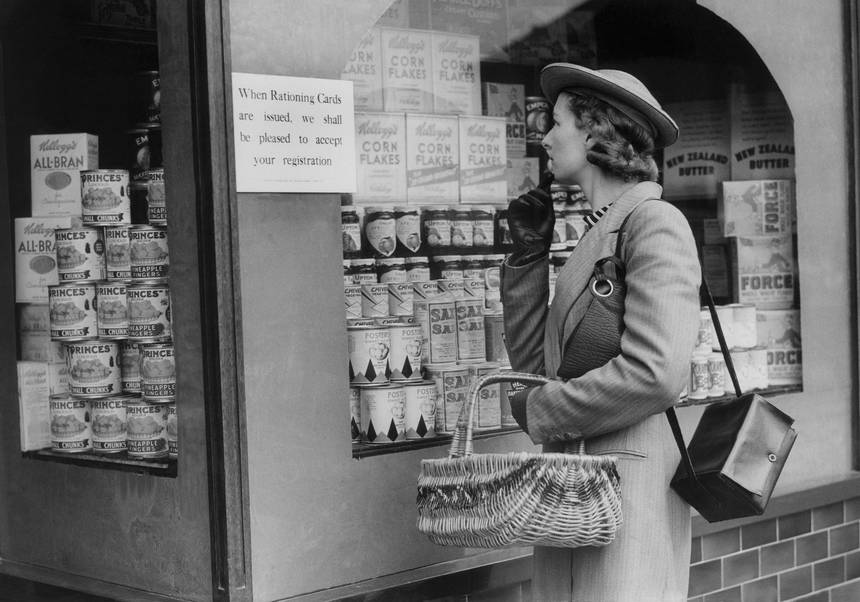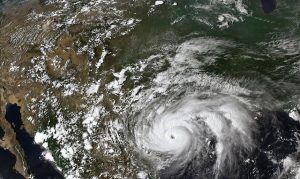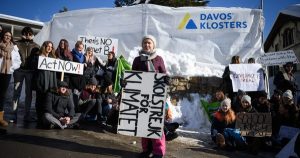It's time to consider carbon rationing, and all that that entails

With a carbon credit card, it doesn’t have to be hard.
Rationing is always controversial. In Beyond the Fringe, Peter Cook remembers the introduction of rationing in the Second World War, and how he used to calm his wife down by saying, “We’ll have a nice cup of boiling hot tea.”
I never used to hear the nine o’clock news because I was always out in the garden round nine-ish planting carrots for the night-fighters. I do remember that black, black day that rationing was imposed. My wife came out to me in the garden, her face a mask of pain. “Charlie,” she said, “rationing has been imposed, and all that that entails.” “Never mind, my dear,” I says to her, “you put on the kettle – we’ll have a nice cup of boiling hot water.”
But it is time to consider rationing again, and all that that entails. How do we reduce our carbon emissions enough to keep the temperature rise below 1.5°C? Some studies suggest that we have to get our average carbon footprint below 2.5 tons of CO2 per year per person. (The average American footprint is 14.92 tons). One way that we have discussed before is rationing carbon, drawing parallels to the rationing during the World Wars. Now that radical left-wing rag, the Globe and Mail, publishes Eleanor Boyle’s article The climate crisis is like a world war. So let’s talk about rationing. She notes that voluntary measures to cut back on carbon emissions have been ineffective, that time is short, and that it may be time for rationing.
 Office of price administration/Public Domain
Office of price administration/Public DomainFairness is what rationing is all about. That’s why so many citizens approved of it during the Second World War. Polls in Canada in 1945 showed that more than 90 per cent of adults felt that rationing had done a good or fair job during the conflict in distributing food equitably, Ian Mosby writes in his 2014 book, Food Will Win the War. Even in Britain, where wartime rationing was more extensive, opinion polls showed that most citizens agreed with government policies aiming to ensure “Fair Shares for All.”
 American Legion Collection/Public Domain
American Legion Collection/Public DomainIt doesn’t mean that everyone just gets their rations through a ration book, like it was during the war; things can be more sophisticated now.
Carbon could be a kind of currency that we spend (along with regular money) when purchasing high-emission goods or services. Each of us could receive an allocation of carbon points to spend in a month or year. These could be stored on a smart bank card. When paying for gasoline or airline tickets or certain foods (or, more broadly, energy use), the card would electronically deduct money plus appropriate numbers of carbon points. If we used our entire allocation, we might be able to purchase more – there are pros and cons to tradeability – from individuals who don’t need them, rewarding them financially for their low-carbon lives.
This is what we discussed over a decade ago: carbon trading, calling it a personal carbon allowance. Those who wanted to feed their V8 powered car could buy credits from people who ride bikes. A British Conservative politician said at the time: “We found that personal carbon trading has real potential to engage the population in the fight against climate change and to achieve significant emissions reductions in a progressive way.”
Boyle notes that “this is a hard sell.” You can read the 791 comments attacking her to confirm that “you can wrap it up in a ‘climate change’ bow but it is just another avenue to limit individual freedom, which is the ultimate goal of every left wing government.” Or “this is a joke.” But she concludes that we don’t really have much choice.
 American Legion Collection/Public Domain
American Legion Collection/Public DomainRationing would change our lives and involve a word I’ve been trying to avoid: sacrifice. But what are we to do? Science shows we have barely 10 years to avoid disaster, suggesting we shouldn’t count entirely on technological innovation or self-moderation. Meanwhile, we’re all in a lifeboat with just enough space for each of us. Should we really be complaining about not getting first-class seats if doing so would bump others? That’s what we’re doing when we consume too much of the stuff that fuels climate change.
 Northwestern University/Public Domain
Northwestern University/Public DomainI have always thought that a personal carbon allowance or ration made sense. If you have your carbon credit card you can make some money selling credits you are not using, or buy some if you want a steak for dinner or a flight to Europe. It has been tried before on a voluntary basis and didn’t gain much traction; it really is time to make it mandatory.
Then I read the comments and realize that with the current state of awareness about the climate crisis, it’s probably not going to happen.
With a carbon credit card, it doesn’t have to be hard.
Please enable JavaScript to view the comments.







